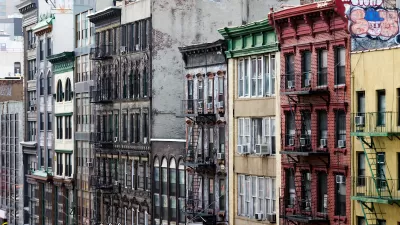In a bid to address concerns about vacation rentals in residential neighborhoods, the San Diego Planning Commission recommends cutting the number of short-term rentals in the city in half.

After years of complaints about loud guests and threats to long-term renters, San Diego leaders are evaluating a proposalto reduce the number of permitted short-term rentals by 50%. "Beyond the disruption the short-term rentals bring with a revolving door of strangers, they destabilize neighborhoods and reduce needed permanent housing supply," Reginald Jones of the Jacobs Center for Neighborhood Innovation told the San Diego Union-Tribune. "They should ultimately be banned from residential areas." Homeowners and renters have both expressed concerns about the effects of short-term rentals on neighborhood character and the rental market, citing Airbnb and its ilk as a major driver of displacement, instability, and scarcity for long-term renters.
Other experts seem less sure, asserting that any new policies should balance the needs of property owners with neighbors and other stakeholders. According to Gary London of London Moeder Advisors, eliminating short-term rentals would have almost no effect on the broader housing crisis faced by many Californians. Ray Major of the San Diego Association of Governments (SANDAG) agreed, saying that while short-term rentals do need regulation, property owners who depend on rental income should be allowed to operate rentals "within a set of reasonable guidelines."
The plan, endorsed by the city's Planning Commission, still requires approval by the San Diego City Council.

Planetizen Federal Action Tracker
A weekly monitor of how Trump’s orders and actions are impacting planners and planning in America.

San Francisco's School District Spent $105M To Build Affordable Housing for Teachers — And That's Just the Beginning
SFUSD joins a growing list of school districts using their land holdings to address housing affordability challenges faced by their own employees.

The Tiny, Adorable $7,000 Car Turning Japan Onto EVs
The single seat Mibot charges from a regular plug as quickly as an iPad, and is about half the price of an average EV.

Seattle's Plan for Adopting Driverless Cars
Equity, safety, accessibility and affordability are front of mind as the city prepares for robotaxis and other autonomous vehicles.

As Trump Phases Out FEMA, Is It Time to Flee the Floodplains?
With less federal funding available for disaster relief efforts, the need to relocate at-risk communities is more urgent than ever.

With Protected Lanes, 460% More People Commute by Bike
For those needing more ammo, more data proving what we already knew is here.
Urban Design for Planners 1: Software Tools
This six-course series explores essential urban design concepts using open source software and equips planners with the tools they need to participate fully in the urban design process.
Planning for Universal Design
Learn the tools for implementing Universal Design in planning regulations.
Smith Gee Studio
City of Charlotte
City of Camden Redevelopment Agency
City of Astoria
Transportation Research & Education Center (TREC) at Portland State University
US High Speed Rail Association
City of Camden Redevelopment Agency
Municipality of Princeton (NJ)





























